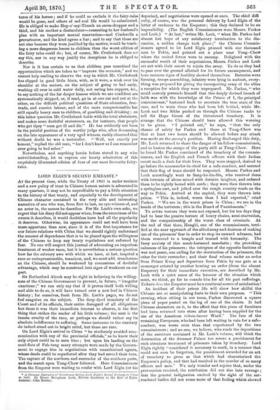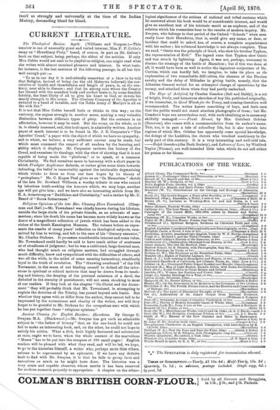LORD ELGIN'S SECOND EMBASSY.*
AT the present time, while the Treaty of 1860 is under revision and a new policy of trust in Chinese human nature is advocated in many quarters, it may not be unprofitable to pay a little attention to the history of that treaty, and especially to the development of Chinese character contained in the very able and interesting narrative of one who was, from first to last, an eye-witness of, and an actor in, the scenes he describes. For Mr. Loch's own sake, we regret that his diary did not appear when, from the recentness of the events it describes, it would doubtless have had all the popularity it deserves. Otherwise, its appearance could not well have been more opportune than now, since it is of the first importance for our future relations with China that we should rightly understand the amount of dependence that is to be placed upon the willingness of the Chinese to keep any treaty regulations not enforced by fear. No one will suspect this journal of advocating an imperious treatment of weaker races, but it is nevertheless a serious question how far the salutary awe with which we have, at last, inspired a race so unimpressionable, tenacious, and, we must add, treacherous as the Chinese, should be weakened by concessions of doubtful advantage, which may be construed into signs of weakness on our part.
Sir Rutherford Alcock may be right in believing in the willing- ness of the Chinese Government to prevent, in future, " irregular exactions ;" we can only say that if it proves itself both willing and able to do so, it will have turned over a new leaf in Chinese history ; for ourselves, fresh from Mr. Loch's pages, we do not feel sanguine on the subject. The deep-dyed treachery of the Court and of its officials, their entire disregard of all obligations but those it was their immediate interest to observe, is the first thing that strikes the reader of his little volume ; the next is the innate cruelty of the race, or perhaps we should rather say its absolute indifference to suffering. Some instances to the contrary do indeed stand out in bright relief, but these are rare.
On Lord Elgin's arrival in China " he studiously avoided cons- munioation with any of the provincial officials," as he knew their only object could be to save time ; but upon his landing on the mud-flats of Peh-tang many attempts were made by the Govern- ment to engage him in negotiations with unauthorized agents, whose deeds could be repudiated after they had served their turn. The capture of the northern and surrender of the southern ports, and the march upon Tung-Chow followed. Here Commissioners from the Emperor were waiting to confer with Lord Elgin (or his
* d Palatial Narrative of Oceurrenca during Lord Elgin's &raid Embassy to China in 1860. By Henry Brougham Loch, Private Secretary to the Earl of Elgin. London : John Murray. deputies), and negotiations were opened at once. The chief diffi culty, of course, was the personal delivery by Lord Elgin of the letter of credence to the Emperor ; this they declared to be an impossibility. (The English Commissioners were Messrs. Parkes and Loch.) " At last," writes Mr. Loch, " when Mr. Parkes had almost lost hope of any satisfactory termination to the dis- cussion, a sudden change took place ;" the Chinese Commis- sioners agreed to let Lord Elgin proceed with one thousand men to Pekin, and pointed out a place near Tung-Chow where the united forces were to encamp. Delighted with the successful result of their negotiations, Messrs. Parkes and Loch set out with their escort to rejoin the army. To do so they had to pass over the ground allotted for its future encampment, and here ominous signs of hostility showed themselves. Batteries were forming, troops assembling, infantry were lying in ambush, every- thing was prepared for giving the unsuspecting army of the allies a reception for which they were unprepared. Mr. Parkes, " who could scarcely persuade himself that this deeply devised breach of faith was with the knowledge of the Prince of I, the principal commissioner," hastened back to ascertain the true state of the case, and to warn those who had been left behind, while Mr. Loch and two Sikhs pushed on through the Chinese ranks to tell Sir Hope Grant of the threatened treachery. It is strange that the Chinese should have allowed this warning to be given. "I pointed out," he says, " that •the only chance of safety for Parkes and those at Tung-Chow was that at least two hours should be allowed before any attack was made on the enemy's position. Having discharged this duty, Mr. Loch returned to share the danger of his fellow-commissioner, and to hasten the escape of the party still at Tung-Chow. Here he fouud Mr. Parkes convinced of the treachery of the commis- sioners, and the English and French officers with their Indian escort made a dash for their lives. They were stopped, desired to go before the commander-in-chief for a safe-conduct, and assured that their flag of truce should be respected. Messrs. Parkes and Loch accordingly went to Sang-ko-lin-Sin, who received them with torrents of abuse mixed with derisive laughter, and ordered them to be tightly bound with cords ; they were then thrown into a springless cart, and jolted over the rough country roads on the way to Pekin. Arrived at the capital, they were thrown into prison. " This is, indeed, worse than I had expected," cried Parkes. "We are in the worst prison in China ; we are in the hands of the torturers ; this is the Board of Punishments."
To active torture they were not exposed, but for ten days they had to bear the passive torture of heavy chains, semi-starvation, and the companionship of the worst class of criminals. At the end of that time, Hangki, one of the commissioners, terri- fied at the near approach of the allied army and desirous of making use of the prisoners' fear in order to stop its onward advance, had them removed to a temple and treated with humanity. The fussy anxiety of this much-harassed mandarin ; the provoking calmness of his prisoners ; the intrigues of the opposite factions of war and peace, one calling for the destruction of the prisoners, the other for their surrender ; and their final release under an order from Prince Aung and departure from Pekin by one gate as a messenger entered by another bearing an order (from the absent Emperor) for their immediate execution, are described by Mr. Loch with a quiet sense of the humour of the situation which must, we think, go far to console him for all his past sufferings. To have done the Emperor must be a continual source of satisfaction!
An incident of their prison life will show how skilful the Chinese are at manipulating facts to their own purposes. " This evening, when sitting in our room, Parkes discovered a square piece of paper pasted on the leg of one of the chairs. It had Chinese characters on it, to the effect that this piece of furniture had been returned into store after having been supplied for the use of the American tribute-bearer Ward." The fate of the remaining Europeans, who had been left waiting in vain for a safe- conduct, was worse even than that experienced by the two commissioners ; and no one, we believe, who reads the depositions of the survivors contained in Mr. Loch's volume, will think the destruction of the Summer Palace too severe a punishment for such atrocious treatment of prisoners taken by treachery. Lord Elgin rightly "considered it necessary to mark, in a manner that could not soon be forgotten, the punishment awarded for an act of treachery So gross as that which had characterized the Emperor's policy, and that had resulted in the murder of so many officers and men." We only wonder and rejoice that, under the provocation received, the retribution did not rise into revenge ; that the general indignation excited by the sight of the sur- rendered bodies did not rouse more of that feeling which showed
itself so strongly and universally at the time of the Indian Mutiny, demanding blood for blood.



































 Previous page
Previous page